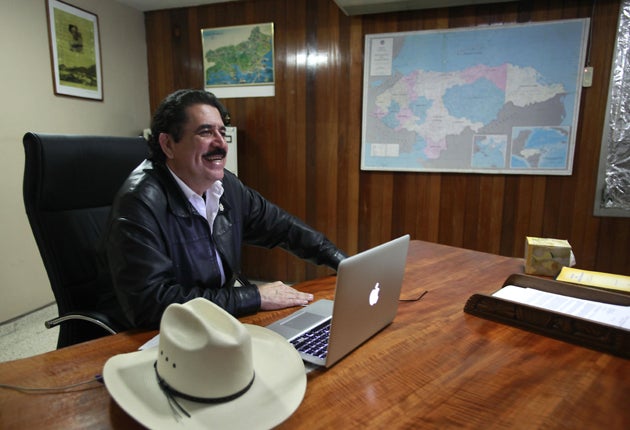Both sides in the political crisis that has gripped Honduras for months appear close to settling their differences, after signing a peace deal that is likely to see the country's ousted President, Manuel Zelaya, temporarily return to power.
The interim government of Roberto Micheletti, installed after a coup in June, agreed on Thursday to allow Mr Zelaya back. He will serve out the remaining three months of his term, sharing power with the court system and Congress.
"I think my restitution is imminent. It's not going to happen in two days, but it will over the next few days," Mr Zelaya said yesterday. "This signifies my return to power... and peace for Honduras. It's a triumph for Honduran democracy."
The exact terms of the agreement were not released, but an election, scheduled for November 29, is now expected go ahead under the watchful eye of the international community. Its victor will be entitled to replace Mr Zelaya in January.
The army, which backed the original coup, will now be controlled by the country's electoral court. The new deal will create both a "verification commission" to ensure that both sides fulfil their commitments, and a "truth commission" to investigate the events of the past four months.
Mr Micheletti told Hondurans on TV that the "final accord" marks "the beginning of the end to the political situation in the country." By allowing Mr Zelaya to return to office he had made a "significant concession", he added.
The former president was removed from office on 28 June, when he was woken before dawn by soldiers and frogmarched to an airport in Tegucigalpa, the nation's capital, in his pyjamas. He was put on a flight to Costa Rica, and Mr Micheletti installed as his replacement. But last month Mr Zelaya smuggled himself back into Honduras in the boot of a car, since when he has been holed up in the Brazilian embassy.
Tensions had been simmering in the Central American country for months. Mr Zelaya started his political life on the centre-right, but lurched dramatically leftwards in office.
His close relationship with Veneuzela's colourful leader Hugo Chavez, and other left-leaning politicians in the region, upset the landowning and business communities, as well as many within his own party. Like Mr Chavez, Mr Zelaya was further accused of seeking to extend term limits so he could remain in office indefinitely, which is a charge he strongly denies. The deal represents a notable success for Barack Obama's administration, which had lobbied hard for the restoration of democracy in its near neighbour. Hillary Clinton, the US Secretary of State, called it "an historic agreement". She told reporters: "I cannot think of another example of a country in Latin America that, having suffered a rupture of its democratic and constitutional order, overcame such a crisis through negotiation and dialogue."

Join our commenting forum
Join thought-provoking conversations, follow other Independent readers and see their replies
Comments